The-Lottery---摸彩书评知识分享
摸彩:雪莉 杰克逊短篇小说选(双语译林 壹力文库)
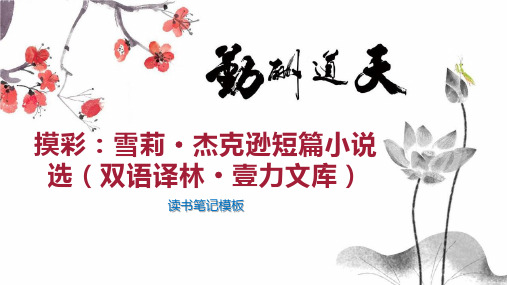
目录分析
第1章译者序 第2章珍妮丝
第3章发中的花椰菜
第4章来爱尔兰与我 共舞
第5章我在乎的不是 钱
第6章我知道我爱着 谁
第7章美丽陌生人 第8章恶魔情人
1
第9章女巫
2
第10章花园
3
第11章摸彩
4
第12章岛
5
第13章夏季的 人们
第15章拜访
第14章岩石
第16章口袋里有花 生的普通一天
1
第17章露易莎, 请回家吧
1
第34章 The Lottery
2
第35章 Island
3 第36章 The
Summer People
4
第37章 The Rock
5
第38章 A Visit
第39章 One Ordinary
Day,with Peanuts
第40章 Louisa,Please
Come Home
第41章 The Little House
内容摘要
内容摘要
《摸彩》是雪莉·杰克逊的代表作,小说揭示田园牧歌般的美国小镇一个隐秘而凶险的侧面,是上世纪最恐 怖的短篇小说之一。这部小说集还收录了雪莉·杰克逊《恶魔情人》《女巫》《邪恶的可能性》等短篇小说,揭 示出日常生活中的哥特元素。
读书笔记
读书笔记
5分翻译真不太行而且故事在那个年代或许有些意思放在现在属实没有新意。 看雪莉的短篇就像在看海龟汤汤面[汗],汤底要靠自己想,并且没有人回答是与不是,就很,懵。 一般人不要看因为你们不懂恐怖文学,鉴赏能力也差,懂的人推荐你们慢慢欣赏。 “群体是无名氏!无名氏不需要为他所做的任何事情承担责任。 看中文版感觉故事大多虎头蛇尾。 23个短篇有一半和花生重复的,但是不重复的我都不太喜欢,有几篇隐晦到看不懂,可能是我的问题吧,相 对更喜欢花生的选篇。 出差途中,心不在焉的翻完。仅此,以上。 已经忘了年少时读雪莉杰克逊的感受,当时和史蒂芬金的小说混在一起消磨暑假,只对结尾反转式的惊悚有 点印象(欧亨利爱好者上分)。 海龟汤爱好 内容摘录。
虚伪的民主
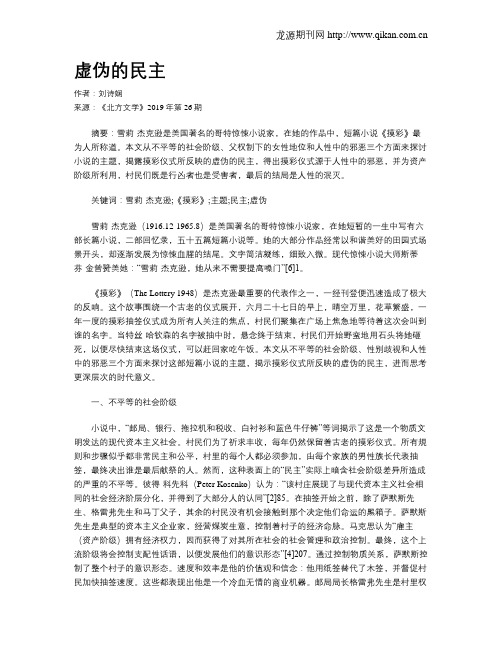
虚伪的民主作者:刘诗娴来源:《北方文学》2019年第26期摘要:雪莉·杰克逊是美国著名的哥特惊悚小说家,在她的作品中,短篇小说《摸彩》最为人所称道。
本文从不平等的社会阶级、父权制下的女性地位和人性中的邪恶三个方面来探讨小说的主题,揭露摸彩仪式所反映的虚伪的民主,得出摸彩仪式源于人性中的邪恶,并为资产阶级所利用,村民们既是行凶者也是受害者,最后的结局是人性的泯灭。
关键词:雪莉·杰克逊;《摸彩》;主题;民主;虚伪雪莉·杰克逊(1916.12-1965.8)是美国著名的哥特惊悚小说家,在她短暂的一生中写有六部长篇小说,二部回忆录,五十五篇短篇小说等。
她的大部分作品经常以和谐美好的田园式场景开头,却逐渐发展为惊悚血腥的结尾。
文字简洁凝练,细致入微。
现代惊悚小说大师斯蒂芬·金曾赞美她:“雪莉·杰克逊,她从来不需要提高嗓门”[6]1。
《摸彩》(The Lottery 1948)是杰克逊最重要的代表作之一,一经刊登便迅速造成了极大的反响。
这个故事围绕一个古老的仪式展开,六月二十七日的早上,晴空万里,花草繁盛,一年一度的摸彩抽签仪式成为所有人关注的焦点,村民们聚集在广场上焦急地等待着这次会叫到谁的名字。
当特丝·哈钦森的名字被抽中时,悬念终于结束,村民们开始野蛮地用石头将她砸死,以便尽快结束这场仪式,可以赶回家吃午饭。
本文从不平等的社会阶级、性别歧视和人性中的邪恶三个方面来探讨这部短篇小说的主题,揭示摸彩仪式所反映的虚伪的民主,进而思考更深层次的时代意义。
一、不平等的社会阶级小说中,“邮局、银行、拖拉机和税收、白衬衫和蓝色牛仔裤”等词揭示了这是一个物质文明发达的现代资本主义社会。
村民们为了祈求丰收,每年仍然保留着古老的摸彩仪式。
所有規则和步骤似乎都非常民主和公平,村里的每个人都必须参加,由每个家族的男性族长代表抽签,最终决出谁是最后献祭的人。
然而,这种表面上的“民主”实际上暗含社会阶级差异所造成的严重的不平等。
《摸彩》中的现代人性隐喻
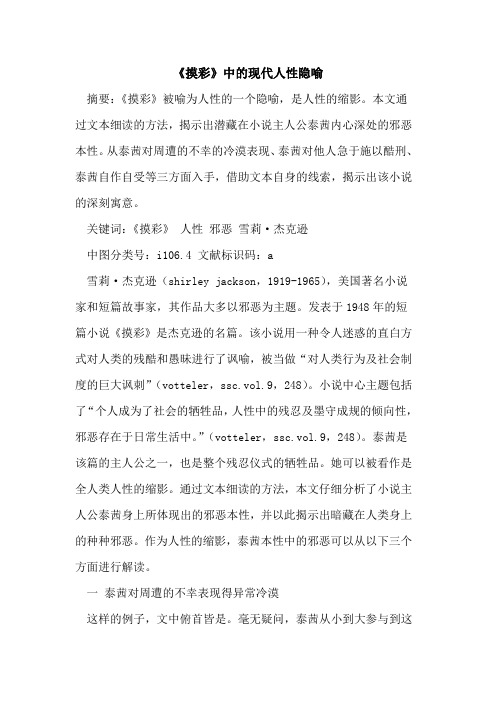
《摸彩》中的现代人性隐喻摘要:《摸彩》被喻为人性的一个隐喻,是人性的缩影。
本文通过文本细读的方法,揭示出潜藏在小说主人公泰茜内心深处的邪恶本性。
从泰茜对周遭的不幸的冷漠表现、泰茜对他人急于施以酷刑、泰茜自作自受等三方面入手,借助文本自身的线索,揭示出该小说的深刻寓意。
关键词:《摸彩》人性邪恶雪莉·杰克逊中图分类号:i106.4 文献标识码:a雪莉·杰克逊(shirley jackson,1919-1965),美国著名小说家和短篇故事家,其作品大多以邪恶为主题。
发表于1948年的短篇小说《摸彩》是杰克逊的名篇。
该小说用一种令人迷惑的直白方式对人类的残酷和愚昧进行了讽喻,被当做“对人类行为及社会制度的巨大讽刺”(votteler,ssc.vol.9,248)。
小说中心主题包括了“个人成为了社会的牺牲品,人性中的残忍及墨守成规的倾向性,邪恶存在于日常生活中。
”(votteler,ssc.vol.9,248)。
泰茜是该篇的主人公之一,也是整个残忍仪式的牺牲品。
她可以被看作是全人类人性的缩影。
通过文本细读的方法,本文仔细分析了小说主人公泰茜身上所体现出的邪恶本性,并以此揭示出暗藏在人类身上的种种邪恶。
作为人性的缩影,泰茜本性中的邪恶可以从以下三个方面进行解读。
一泰茜对周遭的不幸表现得异常冷漠这样的例子,文中俯首皆是。
毫无疑问,泰茜从小到大参与到这种残忍的仪式,不知道有多少回了,她也很清楚地知道,每次摸彩之后,都有一人会被众人用石头砸死。
然而,她这次却忘记了时间,“完全忘记了今天是什么日子”(62);她到达摸彩现场以后,她漫不经心地与德拉克洛瓦夫人闲谈,带着邻里间的幽默,她们两个都“很温柔地放声笑着”(62)。
从这些细节可以明显地看出,她对这次摸彩毫不关心,只是把它当成理所应该的事情了。
至于这次会轮到谁去送死,她似乎并不在意。
然而,她的这种漠然态度并非个例。
所有在场的人都是如此。
死亡马上就会降临到在场的某位村民头上,这人也许是他们的朋友,也许是他们的家人,但都没有人在意这些,所有在场的男男女女,都在愉悦而轻松地谈笑,议论着日常琐事,随意地开着玩笑。
浅析短篇小说THE LOTTERY
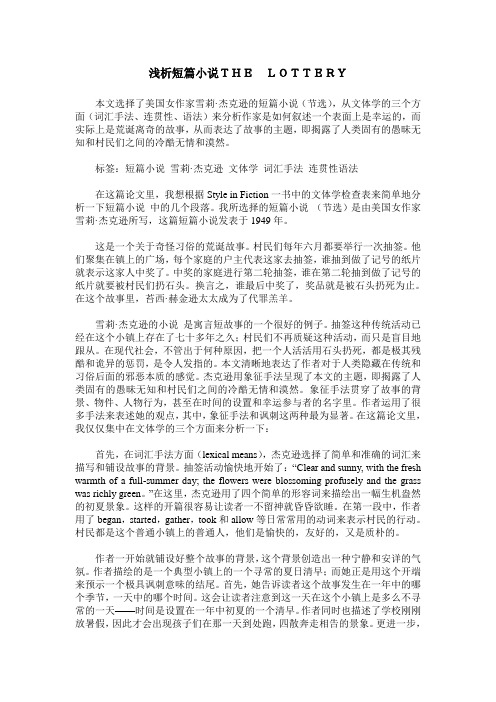
浅析短篇小说THELOTTERY本文选择了美国女作家雪莉·杰克逊的短篇小说(节选),从文体学的三个方面(词汇手法、连贯性、语法)来分析作家是如何叙述一个表面上是幸运的,而实际上是荒诞离奇的故事,从而表达了故事的主题,即揭露了人类固有的愚昧无知和村民们之间的冷酷无情和漠然。
标签:短篇小说雪莉·杰克逊文体学词汇手法连贯性语法在这篇论文里,我想根据Style in Fiction一书中的文体学检查表来简单地分析一下短篇小说中的几个段落。
我所选择的短篇小说(节选)是由美国女作家雪莉·杰克逊所写,这篇短篇小说发表于1949年。
这是一个关于奇怪习俗的荒诞故事。
村民们每年六月都要举行一次抽签。
他们聚集在镇上的广场,每个家庭的户主代表这家去抽签,谁抽到做了记号的纸片就表示这家人中奖了。
中奖的家庭进行第二轮抽签,谁在第二轮抽到做了记号的纸片就要被村民们扔石头。
换言之,谁最后中奖了,奖品就是被石头扔死为止。
在这个故事里,苔西·赫金逊太太成为了代罪羔羊。
雪莉·杰克逊的小说是寓言短故事的一个很好的例子。
抽签这种传统活动已经在这个小镇上存在了七十多年之久;村民们不再质疑这种活动,而只是盲目地跟从。
在现代社会,不管出于何种原因,把一个人活活用石头扔死,都是极其残酷和诡异的惩罚,是令人发指的。
本文清晰地表达了作者对于人类隐藏在传统和习俗后面的邪恶本质的感觉。
杰克逊用象征手法呈现了本文的主题,即揭露了人类固有的愚昧无知和村民们之间的冷酷无情和漠然。
象征手法贯穿了故事的背景、物件、人物行为,甚至在时间的设置和幸运参与者的名字里。
作者运用了很多手法来表述她的观点,其中,象征手法和讽刺这两种最为显著。
在这篇论文里,我仅仅集中在文体学的三个方面来分析一下:首先,在词汇手法方面(lexical means),杰克逊选择了简单和准确的词汇来描写和铺设故事的背景。
抽签活动愉快地开始了:“Clear and sunny, with the fresh warmth of a full-summer day; the flowers were blossoming profusely and the grass was richly green。
《摸彩》中讽刺手法的运用
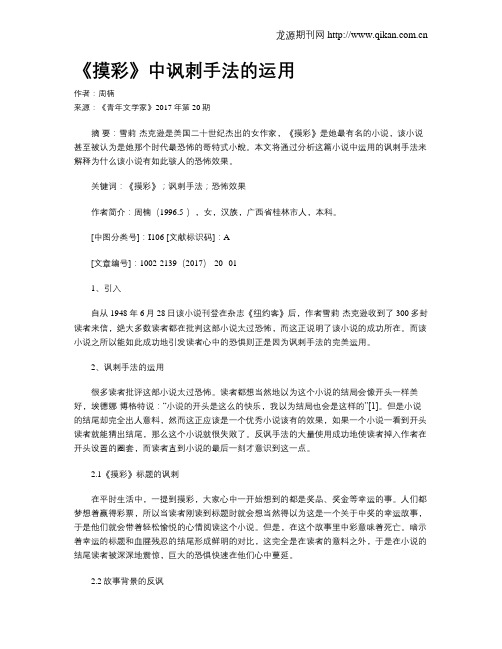
《摸彩》中讽刺手法的运用作者:周楠来源:《青年文学家》2017年第20期摘要:雪莉·杰克逊是美国二十世纪杰出的女作家,《摸彩》是她最有名的小说,该小说甚至被认为是她那个时代最恐怖的哥特式小說。
本文将通过分析这篇小说中运用的讽刺手法来解释为什么该小说有如此骇人的恐怖效果。
关键词:《摸彩》;讽刺手法;恐怖效果作者简介:周楠(1996.5-),女,汉族,广西省桂林市人,本科。
[中图分类号]:I106 [文献标识码]:A[文章编号]:1002-2139(2017)-20--011、引入自从1948年6月 28日该小说刊登在杂志《纽约客》后,作者雪莉·杰克逊收到了300多封读者来信,绝大多数读者都在批判这部小说太过恐怖,而这正说明了该小说的成功所在。
而该小说之所以能如此成功地引发读者心中的恐惧则正是因为讽刺手法的完美运用。
2、讽刺手法的运用很多读者批评这部小说太过恐怖。
读者都想当然地以为这个小说的结局会像开头一样美好,埃德娜-博格特说:“小说的开头是这么的快乐,我以为结局也会是这样的”[1]。
但是小说的结尾却完全出人意料,然而这正应该是一个优秀小说该有的效果,如果一个小说一看到开头读者就能猜出结尾,那么这个小说就很失败了。
反讽手法的大量使用成功地使读者掉入作者在开头设置的圈套,而读者直到小说的最后一刻才意识到这一点。
2.1《摸彩》标题的讽刺在平时生活中,一提到摸彩,大家心中一开始想到的都是奖品、奖金等幸运的事。
人们都梦想着赢得彩票,所以当读者刚读到标题时就会想当然得以为这是一个关于中奖的幸运故事,于是他们就会带着轻松愉悦的心情阅读这个小说。
但是,在这个故事里中彩意味着死亡。
暗示着幸运的标题和血腥残忍的结尾形成鲜明的对比,这完全是在读者的意料之外,于是在小说的结尾读者被深深地震惊,巨大的恐惧快速在他们心中蔓延。
2.2故事背景的反讽这个故事发生在一个和谐、平静、风景如画的小村庄。
摸彩的那天早上阳光明媚,鲜花盛开,绿草青翠欲滴,尽管此刻是盛夏,但你感到的只是舒适的暖流而不是夏日的酷热。
《摸彩》所揭示现实悲哀之源
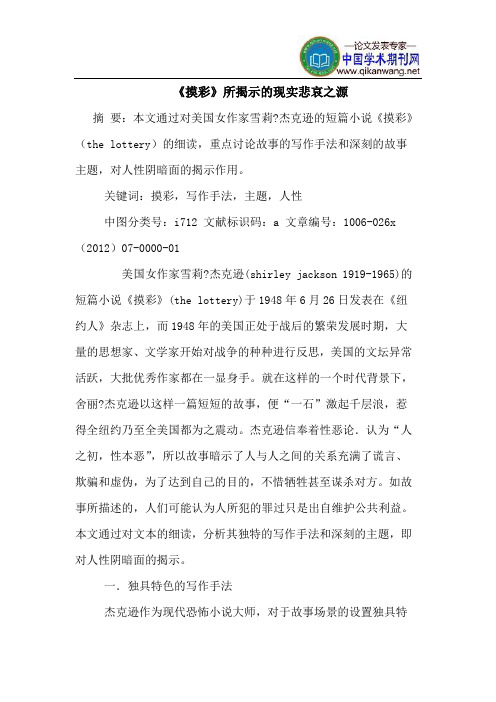
《摸彩》所揭示的现实悲哀之源摘要:本文通过对美国女作家雪莉?杰克逊的短篇小说《摸彩》(the lottery)的细读,重点讨论故事的写作手法和深刻的故事主题,对人性阴暗面的揭示作用。
关键词:摸彩,写作手法,主题,人性中图分类号:i712 文献标识码:a 文章编号:1006-026x (2012)07-0000-01美国女作家雪莉?杰克逊(shirley jackson 1919-1965)的短篇小说《摸彩》(the lottery)于1948年6月26日发表在《纽约人》杂志上,而1948年的美国正处于战后的繁荣发展时期,大量的思想家、文学家开始对战争的种种进行反思,美国的文坛异常活跃,大批优秀作家都在一显身手。
就在这样的一个时代背景下,舍丽?杰克逊以这样一篇短短的故事,便“一石”激起千层浪,惹得全纽约乃至全美国都为之震动。
杰克逊信奉着性恶论.认为“人之初,性本恶”,所以故事暗示了人与人之间的关系充满了谎言、欺骗和虚伪,为了达到自己的目的,不惜牺牲甚至谋杀对方。
如故事所描述的,人们可能认为人所犯的罪过只是出自维护公共利益。
本文通过对文本的细读,分析其独特的写作手法和深刻的主题,即对人性阴暗面的揭示。
一.独具特色的写作手法杰克逊作为现代恐怖小说大师,对于故事场景的设置独具特色,故事中最令人可憎的事件常常发生在和平恬静的普通生活环境中。
《摸彩》就是发生在当代美国的一个荒谬可悲的故事。
故事发生在仲夏时节美国的某个有三百余人的小村庄。
那是6月27日的早上,“晴朗无云,有着盛夏时节新鲜的温暖”(“clear and sunny,with the fresh warmth of a full—summer day”)村子的广场中间聚集着数以百计的村民,场景平和宁静:孩子们天真无邪,没有一丝一毫的邪恶动机玩耍,挑选并守卫着一堆小石子;大人们聚在一起,互相攀谈,聊着降雨,拖拉机等日常涉及的话题;妇女们互相问好,招呼着自己的孩子。
the lottery winner概括-概述说明以及解释
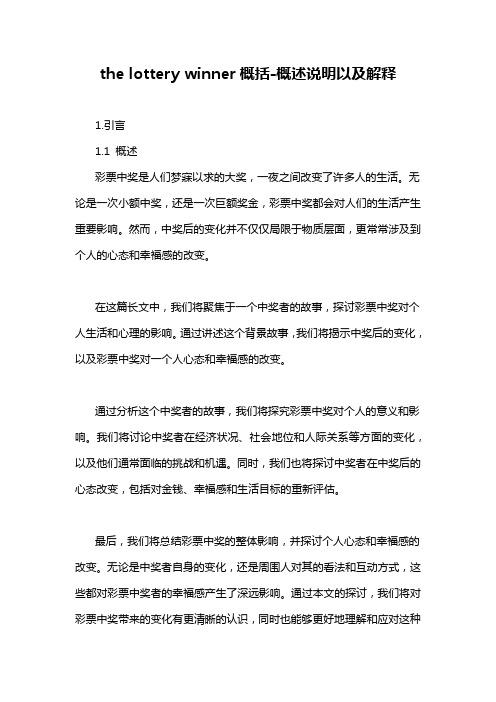
the lottery winner概括-概述说明以及解释1.引言1.1 概述彩票中奖是人们梦寐以求的大奖,一夜之间改变了许多人的生活。
无论是一次小额中奖,还是一次巨额奖金,彩票中奖都会对人们的生活产生重要影响。
然而,中奖后的变化并不仅仅局限于物质层面,更常常涉及到个人的心态和幸福感的改变。
在这篇长文中,我们将聚焦于一个中奖者的故事,探讨彩票中奖对个人生活和心理的影响。
通过讲述这个背景故事,我们将揭示中奖后的变化,以及彩票中奖对一个人心态和幸福感的改变。
通过分析这个中奖者的故事,我们将探究彩票中奖对个人的意义和影响。
我们将讨论中奖者在经济状况、社会地位和人际关系等方面的变化,以及他们通常面临的挑战和机遇。
同时,我们也将探讨中奖者在中奖后的心态改变,包括对金钱、幸福感和生活目标的重新评估。
最后,我们将总结彩票中奖的整体影响,并探讨个人心态和幸福感的改变。
无论是中奖者自身的变化,还是周围人对其的看法和互动方式,这些都对彩票中奖者的幸福感产生了深远影响。
通过本文的探讨,我们将对彩票中奖带来的变化有更清晰的认识,同时也能够更好地理解和应对这种改变所带来的挑战和机遇。
通过这篇长文,读者将能够更好地理解彩票中奖对个人生活和心理的影响。
对于那些梦寐以求中彩的人来说,本文也将帮助他们更好地应对中奖后的变化,以及正确理解和评估幸福感的重要性。
无论是中奖者还是观察者,携手共同探索彩票中奖背后的故事和启示。
1.2文章结构文章结构部分是对整篇文章的组织框架进行介绍,其中包括各个章节的内容和目的。
在本文中,文章分为引言、正文和结论三个部分。
引言部分是文章的开篇,主要介绍整个故事的背景和彩票中奖带来的变化。
在概述部分,可以简要概括彩票中奖者的故事背景和主要发生的事件,如他如何购买彩票,中奖金额以及中奖后的生活变化。
同时,也可以提及该彩票中奖者的姓名和背景,以及彩票中奖这一话题的普遍性和影响力。
文章接下来为正文部分,主要讲述彩票中奖者中奖后的故事和变化。
thelottery读后感

thelottery读后感导读:本文thelottery读后感,仅供参考,如果觉得很不错,欢迎点评和分享。
篇一:the lottery读后感昨天查资料时看到有篇文章这样说Jackson写的这篇故事:美国大多数人应该都知道这篇文章,即使不知道是谁写的,也应该知道“ The Lottery(摸彩)”这个故事。
我感觉,这篇《The Lottery(摸彩)》的性质,应该和《皇帝的新装》差不多吧。
看完那篇《The Lottery》之后,心里嗟吁不已。
那个小镇有个上百年来一直沿袭着的传统,每年六月里的一天,总会把小镇上的人们聚集在一起,摸彩。
随着故事散漫地进展,我也散漫地读着。
天气如何地好,女孩子们如何地聚在一起聊些无聊的话,男孩子们如何地搞闹追逐着玩石块。
大人们如何有一句没一句地拉家常,等着摸彩。
镇长如何地捧了大盒子过来,如何准备工作都做好了。
然后怎样一个人一个人地被叫上去摸彩。
故事就这么有一搭没一搭地进展着。
等所有人都摸了彩以后,镇长才让大家一起打开摸到的纸片。
我呢,仍是不在意地读着。
直到读到结尾,抽到彩的那人原来是要被全村人用石头打死。
于是从刚刚散漫的故事进展中我忽地一惊,吓了一跳。
心里嗟吁不已。
摸彩是这个镇上人上百年来的习俗,每年都要摸彩摸出一个人来,然后其余的人用石块将他打死。
人们在摸彩前后及扔石块时竟没有一点哀痛,只是忙忙碌碌地想快快打完了收工,赶着回家继续各自没干完的活儿。
因为对于这样一个“传统”,镇上的每个人都已是根深蒂固地习惯了,在他们的概念里,摸彩是理所当然的,摸到彩的人要被众人打死也是理所当然的。
而作为局外人,读完之后只觉的哭笑不得,好不可思议!因为这个传统本身就是如此地没道理,如此地荒谬,也如此地恶心。
我开始时不喜欢这个故事,可后来越想便越感受到它寓意的丰蕴醇厚。
事实自然是如此,坚持着一个传统的人自然是觉的自己所坚持的传统是理所当然的。
我们也是如此。
而问题是:你如何知道在这些你认为是理所当然的传统中,哪些是真理,哪些仅仅是由传统和文化影响所成的定式思维呢?哪些是该坚持的,哪些是不该坚持的呢?不光是“传统”,其实是推到我们所信之事的每一个层面。
the lottery中英文对照
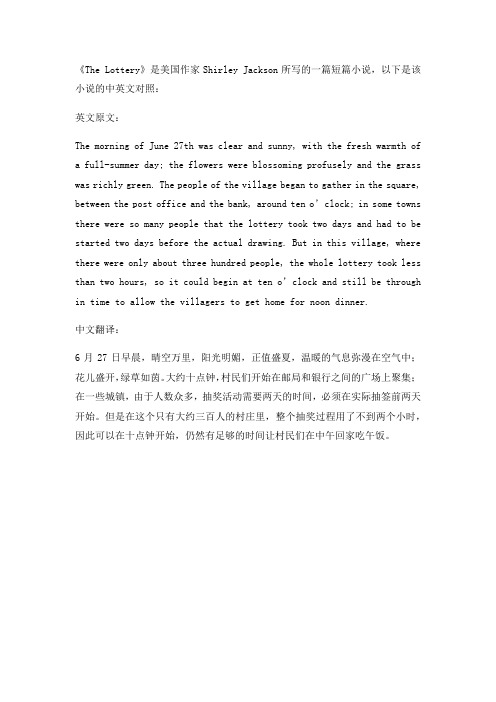
《The Lottery》是美国作家Shirley Jackson所写的一篇短篇小说,以下是该小说的中英文对照:英文原文:The morning of June 27th was clear and sunny, with the fresh warmth of a full-summer day; the flowers were blossoming profusely and the grass was richly green. The people of the village began to gather in the square, between the post office and the bank, around ten o’clock; in some towns there were so many people that the lottery took two days and had to be started two days before the actual drawing. But in this village, where there were only about three hundred people, the whole lottery took less than two hours, so it could begin at ten o’clock and still be through in time to allow the villagers to get home for noon dinner.中文翻译:6月27日早晨,晴空万里,阳光明媚,正值盛夏,温暖的气息弥漫在空气中;花儿盛开,绿草如茵。
大约十点钟,村民们开始在邮局和银行之间的广场上聚集;在一些城镇,由于人数众多,抽奖活动需要两天的时间,必须在实际抽签前两天开始。
但是在这个只有大约三百人的村庄里,整个抽奖过程用了不到两个小时,因此可以在十点钟开始,仍然有足够的时间让村民们在中午回家吃午饭。
-【中】the-lottery
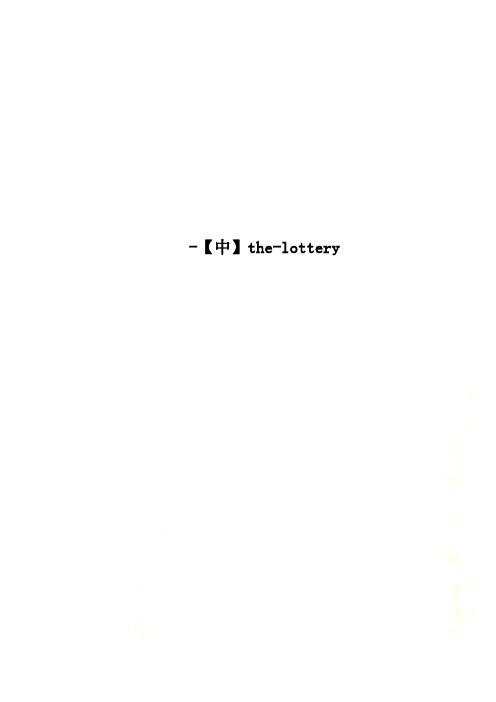
-【中】the-lottery摸彩by SHIRLEY JACKSON雪莱·杰克森六月27日的早晨晴朗无云,有着盛夏时节新鲜的温暖;花儿开得繁茂,草儿长得绿油油。
十点钟左右,村里的人们开始在邮局和银行间的广场上聚集;有些城镇因为人太多,摸彩不得不花上两天,而且要在六月2日开始,但是在这个村子里,只有三百来人,摸彩的全程至多不会超过两小时,所以可以在早晨十点钟开始,并且仍能够让村民们准时回家吃上午饭。
首先集合来的当然是孩子们。
最近学校在放暑假,自由感不安地降落在多数人身上;在他们疯玩起来之前,他们往往会安静地聚在一起一会儿。
他们谈论的仍是学校和老师,书本和惩戒。
博比·马丁已经在他的衣兜里塞满了石子,其他男孩子很快也学起他的样子,挑选了最圆滑的石头;博比和哈里·琼斯还有迪克·戴拉克罗莱——村里人都把这个姓读作“戴拉克罗利”——最后终于在广场一角堆出了一个大石堆,他们守护着石堆,不让其他男孩袭击它。
女孩们站在一边,互相聊着,转过头看到哥哥姐姐们蜂拥而来或是偎依而行。
不久,男人们开始聚来了。
他们看着自己的孩子,讲着种地、雨水、拖拉机还有税收的事。
他们站在一起,离角落里那堆石头很远,他们开的玩笑有些单调,他们只是平静地笑笑。
女人们穿着褪了色的便装和毛衫,继她们的丈夫之后不久也来了。
她们彼此招呼着,闲谈上一两句,然后加入到她们丈夫的行列里。
很快,这些站在丈夫身边的女人们开始喊她们的孩子,孩子们来得很不情愿,必须要叫四、五遍。
博比·马丁躲开了他妈妈抓过来的手,笑着,又跑回到石堆那里。
他爸爸厉声喊了一下,博比赶快过来了,站到爸爸和哥哥中间。
T这次摸彩——就像广场舞会、少年俱乐部、万圣节前夕的节目——由夏莫斯先生主持。
他有时间和精力来投身于市民的活动。
他是个圆脸、快活的男人,他经营煤炭生意,人们很可怜他,因为他没有孩子,妻子又是个那样的泼妇。
当他带着黑木箱来到广场时,村民们窃窃私语起来,他挥挥手,喊道,“今天有点晚了,乡亲们。
论《摸彩》揭示的人性本质(英文论文)
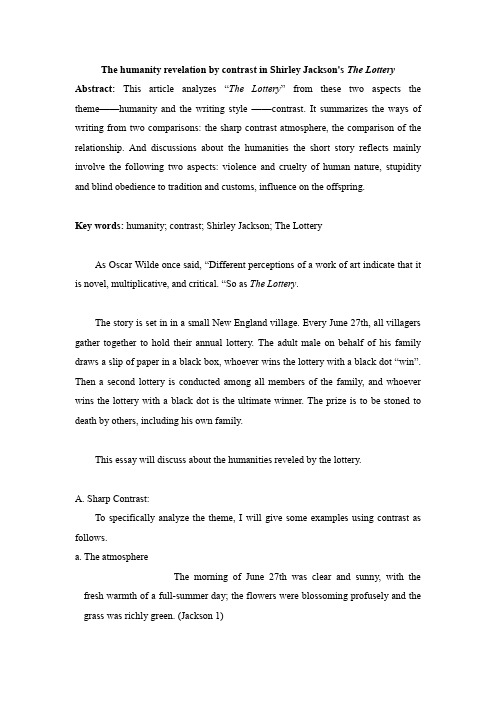
The humanity revelation by contrast in Shirley Jackson's The Lottery Abstract:This article analyzes “The Lottery” from these two aspects the theme——humanity and the writing style ——contrast. It summarizes the ways of writing from two comparisons: the sharp contrast atmosphere, the comparison of the relationship. And discussions about the humanities the short story reflects mainly involve the following two aspects: violence and cruelty of human nature, stupidity and blind obedience to tradition and customs, influence on the offspring.Key words: humanity; contrast; Shirley Jackson; The LotteryAs Oscar Wilde once said, “Different perceptions of a work of art indicate that it is novel, multiplicative, and critical. “So as The Lottery.The story is set in in a small New England village. Every June 27th, all villagers gather together to hold their annual lottery. The adult male on behalf of his family draws a slip of paper in a black box, whoever wins the lottery with a black dot “win”. Then a second lottery is conducted among all members of the family, and whoever wins the lottery with a black dot is the ultimate winner. The prize is to be stoned to death by others, including his own family.This essay will discuss about the humanities reveled by the lottery.A. Sharp Contrast:To specifically analyze the theme, I will give some examples using contrast as follows.a. The atmosphereThe morning of June 27th was clear and sunny, with the fresh warmth of a full-summer day; the flowers were blossoming profusely and the grass was richly green. (Jackson 1)Rather than using the traditional Gothic horror novels' icons ——ancient castle background, haunted plots, bloody scenes and so on, Shirley depicts a quiet and peaceful environment at the beginning, showing a super-aloof attitude and a super-plain tone in her narration”. However, the ending of the final murder comes as a cliff-jumping scare, which makes the readers shudder and feel a strong atmosphere of terror.b. The comparison of the relationship between villagers before and after the lotteryBefore the lottery, the gathered villagers and Mrs. Hutchinson, who arrived late, greeted and chatted in a natural and kind way among neighbors.Mrs. Hutchinson reached her husband, and Mr. Summers, who had been waiting, said cheerfully. “Thought we were going to have to get on without you, Tessie.” Mrs. Hutchinson said, grinning. “Wouldn't have me leave m'dishes in the sink, now, would you. Joe?” And soft laughter ran through the crowd as the people stirred back into position after Mrs. Hutchinson's arrival. (Jackson 3)Nevertheless, when the lottery was over, the friendly attitude of each other took a turn for the worse: the “cultured” villagers swarmed up, picked up stones insanely and threw them at Mrs. Hutchinson, including the previously friendly Mrs. Delacroix.The hypocrisy of friendship was laid bare.The author ruthlessly exposes the hypocrisy of human nature by the comparison between the peaceful and harmonious neighbor relationship and cruelty in collective persecution.To summarize the ways of presenting Jackson used in her works are: “sharp contrast setting, Hemingway's style of narration, intensive symbolism, massive ironyand satire as well as Gothic style fable”(鲁晓晓24). These indicate innovative writing techniques not only reflect her genius writing styles, but also make it easier to understand her works.B. The theme: the humanitya. Violence and cruelty of human nature in the villageJackson emphasizes the nature of humanity to pursue good fortune and avoid disaster. In order to save themselves, the villagers, including Tessie’s friends and family, joined in the murder. For example, at the beginning of the story, Mrs. Delacroix was described to us as being kind to Tessie, but when she knew that Tessie got the paper with black spot, she “selected a stone so large she had to pick it up with both hands” (Jackson 6), and urged Mrs. Dunbar to move. With witty and brisk writing, the readers are led into the dark side of human nature step by step.Even the most precious husband and wife relationship and family relationship in the world cannot stand up to the savage ritual. It’s a test of selfishness, ruthlessness and hypocrisy.Nancy and Bill. Jr. opened theirs at the same time, and both beamed and laughed, turning around to the crowd and holding their slips of paper above their heads. (Jackson 5)After the lottery at the Hutchinson, Mrs. Hutchinson dissented the fairness of the lottery, but her husband Bill Hutchinson snapped at his wife, “shut up!”. He even didn’t forget to show his majesty as head of the family and his “serious” attitude toward the lottery.Within the family, the mother, Mrs. Hutchinson also asked to allow her married daughter to join the lottery to reduce her chances of winning the lottery, which mirrors the selfishness and indifference to others in human’s dark side.They exude the primitive animal nature of human beings. But under the hypocritical appearance are cruel violence and indifferent selfish hearts, this ritual nakedly reveals the essence of humanity under the fig leaf to the readers.The thrilling thing about this story is that it suggests that modern people still live in this savage village, where the slaughter excites children, exalts ritual defenders, and leaves adults indifferent, so that it is accepted as “necessary evil”.Human nature being what it is, most people stick with default settings.b. Stupidity and blind obedience to tradition and customsIn the novel, “lottery” as a ritual has endured for a long time, and it only comes from an ancient saying: Lottery in June, corn be heavy soon, which fully reveals the ignorance of human credulity and ignorance. In the face of the brutal and violent lottery ceremony where everyone could become a scapegoat, the villagers do not question or resist, but become participants in this ridiculous ceremony, even if they do not understand the origin and meaning of it.Even if the villagers can't remember most details of the lottery; even if their acquaintance or even relatives will be stoned to death every year; even if the black box shell of the lottery ticket rots into pieces; the lottery ceremony still continues year after year.We have created a “civilization” together, and then let it eat us.As is discussed above, Mrs. Hutchison suffered from the oppression of the brutal ceremony and wants to break loose from the convention. However, even if she was the person who was sentenced to be stoned to death, she didn’t revolt the tradition itself. It was not the traditional ritual that she was angry about and yelling for, but the unfairness that the presider Mr. Summers didn’t give her husband enough time “totake any paper he wanted” (Jackson 4). How sad!c. About the childrenIn the story, there is a little girl whispered, “I hope it's not Nancy” (Jackson 5). Her words are her struggle against the brutal tradition.However, Old Man Warner also said “Pack of young fools” to the people who opposed the lottery. The contrast between old and young suggests that no matter how confusing and absurd the lottery tradition is, the old tradition still reigns and dominates, for 77 years. Mr. Graves helped little Dave take “the slip of paper” (Jackson 6). And when Mrs. Harrison was killed at the end, “The children had stones already” (Jackson 6).From old Warner, middle-aged Mr. Griffiths to children, it suggests that the lottery and slaughter will be passed on indefinitely. In the murder, little Davy himself went from “looking up at him wonderingly” (Jackson 5) to “someone gave little Davy Hutchinson few pebbles” (Jackson 6). Taking a small child as an example, it shows in detail the process of children from born naivety to being taught ignorance and cruelty.What is more important is that the little David selected by the author is even the child of Mrs. Harrison, who is about to be executed. Learn to grow, learn to kill, and gradually lose humanity, and may become the next old Warner. The brutal murder teaches children to engage in the sin and grow up as slaughter.By the way, the reason why this masterpiece cannot be ignored today, perhaps is that the reader will never forget the author’s writing skills, or rather to say, we cannot forget the body-shuddering horror in the story from the bottom of heart.All in all, Jackson's short stories aim at telling people that horror not only can originate from the horrifying surroundings, ghosts, or vampires, but more important,originate from people's own hearts. After all, humanity is a mixture of good and bad qualities.References[1]李楠.《摸彩》中泰西·赫群森命运的解读【J】.青年文学家.2017(08):88-89[2]王容宁,林玉鹏.从存在主义角度读雪莉·杰克森的《摸彩》【J】.海外英语.2013(10):215-216[3]刘胡英.从对人性的揭示来看小说《摸彩》的艺术风格【J】.中南林业科技大学学报(社会科学版).2010(04):93-96[4]赵博艺.规训下的恶托邦——基于福柯理论对《摸彩》的社会分析【J】.名作欣赏.2020(09):142-143+146[5]贾建树.基于雪莉·杰克逊短篇小说Lottery对“恐怖”的表现手法研究【J】.英语广场.2018(05):34-36Works cited[1] Shirley Jackson. The Lottery. 【C】Ed.X.J. Kennedy and Dana Gioia.Literature: An Introduction toFiction, Poetry, and Drama. New York: Longman,2002:254-261.[2]鲁晓晓.从女性哥特角度解读雪莉·杰克逊的短篇小说集《摸彩》【D】.哈尔滨工程大学.2015(07)。
The Lottery 摸彩书评
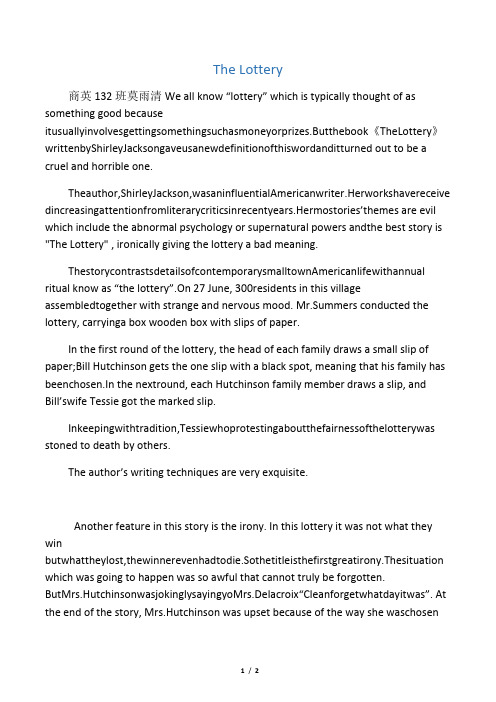
The Lottery商英132班莫雨清We all know “lottery” which is typically thought of as something good because itusuallyinvolvesgettingsomethingsuchasmoneyorprizes.Butthebook《TheLottery》writtenbyShirleyJacksongaveusanewdefinitionofthiswordanditturned out to be a cruel and horrible one.Theauthor,ShirleyJackson,wasaninfluentialAmericanwriter.Herworkshavereceive dincr easingattentionfromliterarycriticsinrecentyears.Hermostories’themes are evil which include the abnormal psychology or supernatural powers andthe best story is "The Lottery" , ironically giving the lottery a bad meaning.ThestorycontrastsdetailsofcontemporarysmalltownAmericanlifewithannual ritual know as “the lottery”.On 27 June, 300residents in this village assembledtogether with strange and nervous mood. Mr.Summers conducted the lottery, carryinga box wooden box with slips of paper.In the first round of the lottery, the head of each family draws a small slip of paper;Bill Hutchinson gets the one slip with a black spot, meaning that his family has beenchosen.In the nextround, each Hutchinson family member draws a slip, and Bill’swife Tessie got the marked s lip.Inkeepingwithtradition,Tessiewhoprotestingaboutthefairnessofthelotterywas stoned to death by others.The author’s writing techniques are very exquisite.Another feature in this story is the irony. In this lottery it was not what they winbutwhattheylost,thewinnerevenhadtodie.Sothetitleisthefirstgreatirony.Thesituation which was going to happen was so awful that cannot truly be forgotten.ButMrs.HutchinsonwasjokinglysayingyoMrs.Delacroix“Cleanforgetwhatdayitwas”. At the end of the story, Mrs.Hutchinson was upset because of the way she waschosenrather than the doom. She shouted out “It isn’t fair, it isn’t right”. The situationis extremely ironic to the story.In real life, sometimes we should keep our own minds and don’t follow the herdblindly because the untested life is not worth living.。
The Lottery彩票英文读后感
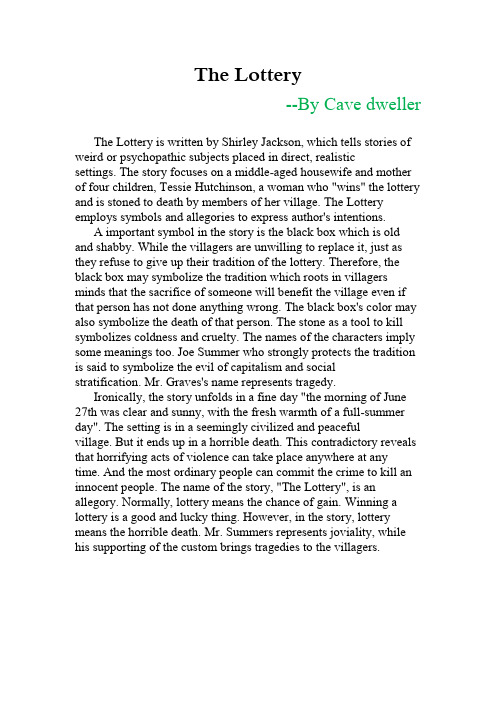
The Lottery--By Cave dweller The Lottery is written by Shirley Jackson, which tells stories of weird or psychopathic subjects placed in direct, realistic settings. The story focuses on a middle-aged housewife and mother of four children, Tessie Hutchinson, a woman who "wins" the lottery and is stoned to death by members of her village. The Lottery employs symbols and allegories to express author's intentions.A important symbol in the story is the black box which is old and shabby. While the villagers are unwilling to replace it, just as they refuse to give up their tradition of the lottery. Therefore, the black box may symbolize the tradition which roots in villagers minds that the sacrifice of someone will benefit the village even if that person has not done anything wrong. The black box's color may also symbolize the death of that person. The stone as a tool to kill symbolizes coldness and cruelty. The names of the characters imply some meanings too. Joe Summer who strongly protects the tradition is said to symbolize the evil of capitalism and social stratification. Mr. Graves's name represents tragedy.Ironically, the story unfolds in a fine day "the morning of June 27th was clear and sunny, with the fresh warmth of a full-summer day". The setting is in a seemingly civilized and peacefulvillage. But it ends up in a horrible death. This contradictory reveals that horrifying acts of violence can take place anywhere at any time. And the most ordinary people can commit the crime to kill an innocent people. The name of the story, "The Lottery", is an allegory. Normally, lottery means the chance of gain. Winning a lottery is a good and lucky thing. However, in the story, lottery means the horrible death. Mr. Summers represents joviality, while his supporting of the custom brings tragedies to the villagers.。
解读雪莉杰克逊的短篇小说《抽彩》的象征意义
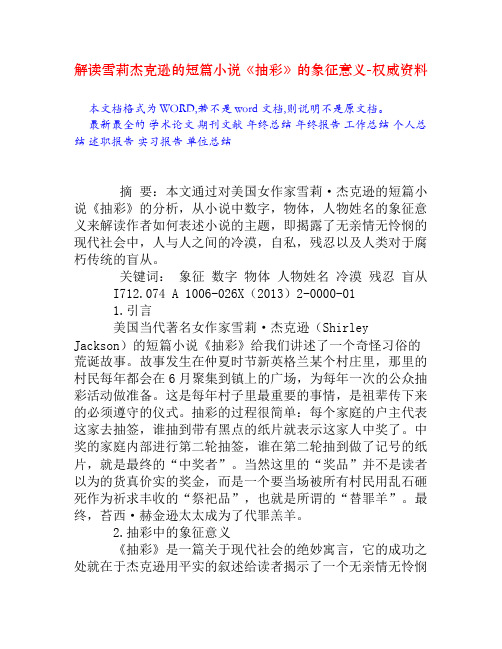
解读雪莉杰克逊的短篇小说《抽彩》的象征意义-权威资料本文档格式为WORD,若不是word文档,则说明不是原文档。
最新最全的学术论文期刊文献年终总结年终报告工作总结个人总结述职报告实习报告单位总结摘要:本文通过对美国女作家雪莉·杰克逊的短篇小说《抽彩》的分析,从小说中数字,物体,人物姓名的象征意义来解读作者如何表述小说的主题,即揭露了无亲情无怜悯的现代社会中,人与人之间的冷漠,自私,残忍以及人类对于腐朽传统的盲从。
关键词:象征数字物体人物姓名冷漠残忍盲从I712.074 A 1006-026X(2013)2-0000-011.引言美国当代著名女作家雪莉·杰克逊(Shirley Jackson)的短篇小说《抽彩》给我们讲述了一个奇怪习俗的荒诞故事。
故事发生在仲夏时节新英格兰某个村庄里,那里的村民每年都会在6月聚集到镇上的广场,为每年一次的公众抽彩活动做准备。
这是每年村子里最重要的事情,是祖辈传下来的必须遵守的仪式。
抽彩的过程很简单:每个家庭的户主代表这家去抽签,谁抽到带有黑点的纸片就表示这家人中奖了。
中奖的家庭内部进行第二轮抽签,谁在第二轮抽到做了记号的纸片,就是最终的“中奖者”。
当然这里的“奖品”并不是读者以为的货真价实的奖金,而是一个要当场被所有村民用乱石砸死作为祈求丰收的“祭祀品”,也就是所谓的“替罪羊”。
最终,苔西·赫金逊太太成为了代罪羔羊。
2.抽彩中的象征意义《抽彩》是一篇关于现代社会的绝妙寓言,它的成功之处就在于杰克逊用平实的叙述给读者揭示了一个无亲情无怜悯的现代社会:冷漠,自私,残忍等一切罪恶的本性始终存在于人与人之间。
小说中作者反映的人们对于恶势力的屈从,对于陈旧陋习的遵从,对于残酷惩罚的漠然,都无数次地震撼着读者。
在小说里,我们可以清晰的看到作者运用了很多手法来表述她的观点,其中,象征的手法最为显著。
作者把象征贯穿于整个故事:背景、物件、人物行为,甚至在时间的设置和参与者的名字里处处体现着作者的独具匠心,随时随地都能体现到小说的主题。
美国经典短篇小说TheLottery完整评析
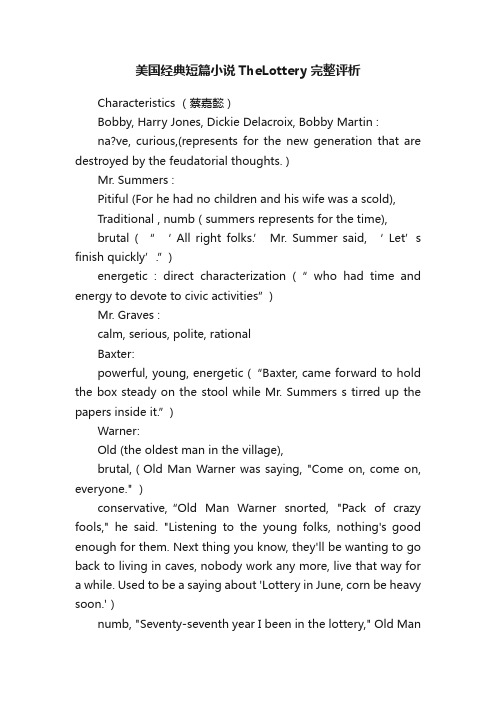
美国经典短篇小说TheLottery完整评析Characteristics (蔡嘉懿)Bobby, Harry Jones, Dickie Delacroix, Bobby Martin :na?ve, curious,(represents for the new generation that are destroyed by the feudatorial thoughts. )Mr. Summers :Pitiful (For he had no children and his wife was a scold),Traditional , numb ( summers represents for the time),brutal ( “ ‘ All right folks.’ Mr. Summer said, ‘ Let’s finish quickly’.”)energetic : direct characterization (“ w ho had time and energy to devote to civic activities”)Mr. Graves :calm, serious, polite, rationalBaxter:powerful, young, energetic (“Baxter, came forward to hold the box steady on the stool while Mr. Summers s tirred up the papers inside it.”)Warner:Old (the oldest man in the village),brutal,(Old Man Warner was saying, "Come on, come on, everyone." )conservative,“Old Man Warner snorted, "Pack of crazy fools," he said. "Listening to the young folks, nothing's good enough for them. Next thing you know, they'll be wanting to go back to living in caves, nobody work any more, live that way for a while. Used to be a saying about 'Lottery in June, corn be heavy soon.')numb, "Seventy-seventh year I been in the lottery," Old ManWarner said as he went through the crowd. "Seventy-seventh time."stubborn "Nothing but trouble in that," Old Man Warner said stoutly. "Pack of young fools." Mrs. Hutchinson:tragic, ( She “won” the lottery)helpless, (Everyone is happy that the person who won the lottery is not them. No one is feeling sad or unfair for her) selfish(asked to let her daughter join the second round of lottery)Mrs. Dunbar/ Mrs. Delacroix:chilling, hypocritical, ( She talked to Mrs. Hutchinson so friendly before she was picked to be the person who was going to die. Then, she chose a big stone to kill her “friend”. ) brutal( she chose a big stone)Waston:brave, love his mother, responsible (draw the lottery for his mother)Mr. Adams and Mrs. Adams:Dare to question, aware of the bad of the lottery,( "They do say," Mr. Adams said to Old Man Warner, who stood next to him, "that over in the north village they're talking of giving up the lottery.")Nancy and Bill:cold and detached, selfish ( As they were happy when they knew they were not going to die)Devices: (蔡嘉懿)1.Indirect characterization: For example, Warner, the oldest man. The author uses his words todescribe him as a brutal, conservative, numb, stubborn man.“Old Man Warner snorted, "Pack of crazy fools," he said."Listening to the young folks, nothing's good enough for them. Next thing you know, they'll be wanting to go back to living in caves, nobody work any more, live that way for a while. Used to be a saying about 'Lottery in June, corn be heavy soon.’”Here, he believed the advantages of lottery, keeping the old conception instead of accepting new ideas.2.Irony(1)“Mrs. Delacroix said, "You're in time, though. They're still talking away up there.""Seems like there's no time at all between lotteries any more," Mrs. Delacroix said to Mrs.Graves in the back row. "Seems like we got through with the last one only last week."From the quotation, we know that Mrs. Delacroix talked friendly to Mrs. Hutchinson, but later on she killed her with a big stone without any pity. Author uses ironic tone to express the detest of the folks who believe in old tradition and criticizes both the traditions and folks like Mrs. Delacroix.(2) “Delacroix-- the villagers pronounced this name "Dellacroy"”the original meaning of“Delacroix”is the Cross which represents for “Christianity”.Then, author uses irony of people’s mistake of pronouncing that word to criticize their misunderstanding of Christianity by doing Lottery.3.Repetition(1)“Tessie Hutchinson shouted to Mr. Summers, "You didn't give him time enough to takea ny paper he wanted. I saw you. It wasn't fair!"”"It isn't fair, it isn't right," Mrs. Hutchinson screamed and then they were upon her.Here, the author uses the repetition of the words of Mrs. Hutchinson stating “unfair” to show her sorrow and fear. She better passes the message of the bad of the Lottery through emphasizing the pain .(2)The black boxThe author describe the black box over and over again in order to criticize the old tradition through the repetition of the black box.4.Symbolize(1)Mr. Su mmer is the name of one main character. “Summer” is the symbol of years andpassing time which is also ironically revealing that the folks are numb.(2)the original meaning of “Delacroix”is the Cross which is the symbol for“Christianity” .Then, author uses irony of people’s mistake of pronouncing that word to criticize their misunderstanding of Christianity by doing Lottery.(3)The name “Graves” is the symbol of death.。
《摸彩》中的现代人性隐喻[权威资料]
![《摸彩》中的现代人性隐喻[权威资料]](https://img.taocdn.com/s3/m/3d658335bdd126fff705cc1755270722182e5950.png)
《摸彩》中的现代人性隐喻摘要:《摸彩》被喻为人性的一个隐喻,是人性的缩影。
本文通过文本细读的方法,揭示出潜藏在小说主人公泰茜内心深处的邪恶本性。
从泰茜对周遭的不幸的冷漠表现、泰茜对他人急于施以酷刑、泰茜自作自受等三方面入手,借助文本自身的线索,揭示出该小说的深刻寓意。
关键词:《摸彩》人性邪恶雪莉・杰克逊I106.4 A雪莉・杰克逊(Shirley Jackson,1919-1965),美国著名小说家和短篇故事家,其作品大多以邪恶为主题。
发表于1948年的短篇小说《摸彩》是杰克逊的名篇。
该小说用一种令人迷惑的直白方式对人类的残酷和愚昧进行了讽喻,被当做“对人类行为及社会制度的巨大讽刺”(Votteler,Ssc.Vol.9,248)。
小说中心主题包括了“个人成为了社会的牺牲品,人性中的残忍及墨守成规的倾向性,邪恶存在于日常生活中。
”(Votteler,Ssc.Vol.9,248)。
泰茜是该篇的主人公之一,也是整个残忍仪式的牺牲品。
她可以被看作是全人类人性的缩影。
通过文本细读的方法,本文仔细分析了小说主人公泰茜身上所体现出的邪恶本性,并以此揭示出暗藏在人类身上的种种邪恶。
作为人性的缩影,泰茜本性中的邪恶可以从以下三个方面进行解读。
一泰茜对周遭的不幸表现得异常冷漠这样的例子,文中俯首皆是。
毫无疑问,泰茜从小到大参与到这种残忍的仪式,不知道有多少回了,她也很清楚地知道,每次摸彩之后,都有一人会被众人用石头砸死。
然而,她这次却忘记了时间,“完全忘记了今天是什么日子”(62);她到达摸彩现场以后,她漫不经心地与德拉克洛瓦夫人闲谈,带着邻里间的幽默,她们两个都“很温柔地放声笑着”(62)。
从这些细节可以明显地看出,她对这次摸彩毫不关心,只是把它当成理所应该的事情了。
至于这次会轮到谁去送死,她似乎并不在意。
然而,她的这种漠然态度并非个例。
所有在场的人都是如此。
死亡马上就会降临到在场的某位村民头上,这人也许是他们的朋友,也许是他们的家人,但都没有人在意这些,所有在场的男男女女,都在愉悦而轻松地谈笑,议论着日常琐事,随意地开着玩笑。
the lottery ticket读后感
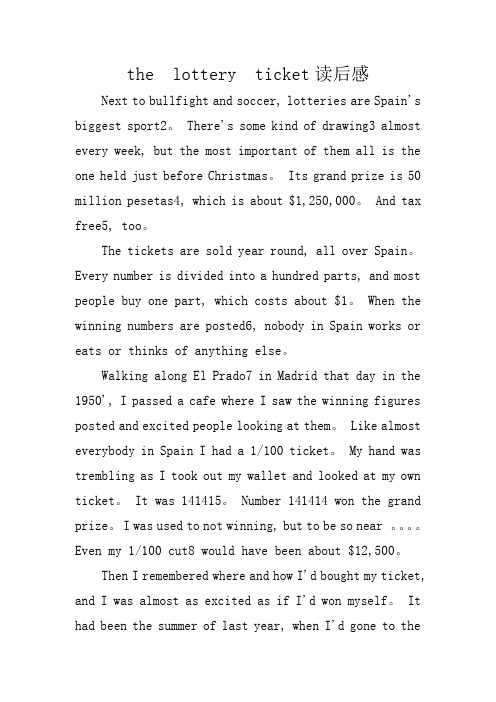
the lottery ticket读后感Next to bullfight and soccer, lotteries are Spain's biggest sport2。
There's some kind of drawing3 almost every week, but the most important of them all is the one held just before Christmas。
Its grand prize is 50 million pesetas4, which is about $1,250,000。
And tax free5, too。
The tickets are sold year round, all over Spain。
Every number is divided into a hundred parts, and most people buy one part, which costs about $1。
When the winning numbers are posted6, nobody in Spain works or eats or thinks of anything else。
Walking along El Prado7 in Madrid that day in the 1950', I passed a cafe where I saw the winning figures posted and excited people looking at them。
Like almost everybody in Spain I had a 1/100 ticket。
My hand was trembling as I took out my wallet and looked at my own ticket。
the lottery读后感

the lottery读后感我感觉,这篇《 The Lottery(摸彩)》的性质,应该和《皇帝的新装》差不多吧。
看完那篇《 The Lottery》之后,心里嗟吁不已。
那个小镇有个上百年来一直沿袭着的传统,每年六月里的一天,总会把小镇上的人们聚集在一起,摸彩。
随着故事散漫地进展,我也散漫地读着。
天气如何地好,女孩子们如何地聚在一起聊些无聊的话,男孩子们如何地搞闹追逐着玩石块。
大人们如何有一句没一句地拉家常,等着摸彩。
镇长如何地捧了大盒子过来,如何准备工作都做好了。
然后怎样一个人一个人地被叫上去摸彩。
故事就这么有一搭没一搭地进展着。
等所有人都摸了彩以后,镇长才让大家一起打开摸到的纸片。
我呢,仍是不在意地读着。
直到读到结尾,抽到彩的那人原来是要被全村人用石头打死。
于是从刚刚散漫的故事进展中我忽地一惊,吓了一跳。
心里嗟吁不已。
摸彩是这个镇上人上百年来的习俗,每年都要摸彩摸出一个人来,然后其余的人用石块将他打死。
人们在摸彩前后及扔石块时竟没有一点哀痛,只是忙忙碌碌地想快快打完了收工,赶着回家继续各自没干完的活儿。
因为对于这样一个传统,镇上的每个人都已是根深蒂固地习惯了,在他们的概念里,摸彩是理所当然的,摸到彩的人要被众人打死也是理所当然的。
而作为局外人,读完之后只觉的哭笑不得,好不可思议!因为这个传统本身就是如此地没道理,如此地荒谬,也如此地恶心。
我开始时不喜欢这个故事,可后来越想便越感受到它寓意的丰蕴醇厚。
事实自然是如此,坚持着一个传统的人自然是觉的自己所坚持的传统是理所当然的。
我们也是如此。
而问题是:你如何知道在这些你认为是理所当然的传统中,哪些是真理,哪些仅仅是由传统和文化影响所成的定式思维呢?哪些是该坚持的,哪些是不该坚持的呢?不光是传统,其实是推到我们所信之事的每一个层面。
我不是说该怀疑所有,我是说,总有些是该被怀疑推止的,也总有些是该经的起怀疑的洗礼后更加坚稳的。
小说《摸彩》主题分析
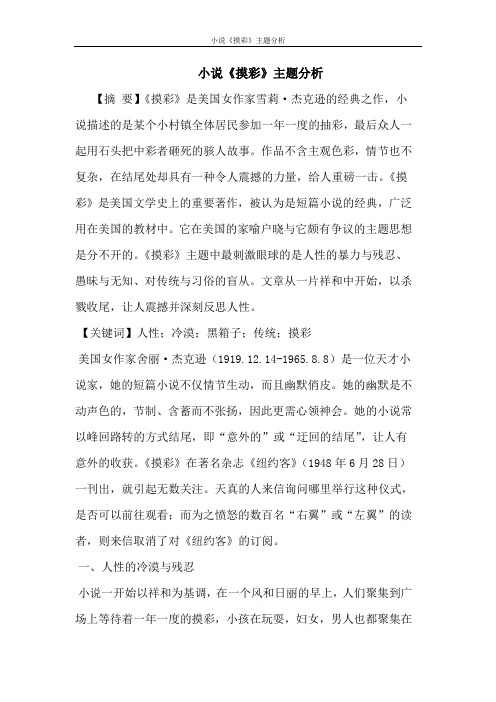
小说《摸彩》主题分析【摘要】《摸彩》是美国女作家雪莉·杰克逊的经典之作,小说描述的是某个小村镇全体居民参加一年一度的抽彩,最后众人一起用石头把中彩者砸死的骇人故事。
作品不含主观色彩,情节也不复杂,在结尾处却具有一种令人震撼的力量,给人重磅一击。
《摸彩》是美国文学史上的重要著作,被认为是短篇小说的经典,广泛用在美国的教材中。
它在美国的家喻户晓与它颇有争议的主题思想是分不开的。
《摸彩》主题中最刺激眼球的是人性的暴力与残忍、愚昧与无知、对传统与习俗的盲从。
文章从一片祥和中开始,以杀戮收尾,让人震撼并深刻反思人性。
【关键词】人性;冷漠;黑箱子;传统;摸彩美国女作家舍丽·杰克逊(1919.12.14-1965.8.8)是一位天才小说家,她的短篇小说不仅情节生动,而且幽默俏皮。
她的幽默是不动声色的,节制、含蓄而不张扬,因此更需心领神会。
她的小说常以峰回路转的方式结尾,即“意外的”或“迂回的结尾”,让人有意外的收获。
《摸彩》在著名杂志《纽约客》(1948年6月28日)一刊出,就引起无数关注。
天真的人来信询问哪里举行这种仪式,是否可以前往观看;而为之愤怒的数百名“右翼”或“左翼”的读者,则来信取消了对《纽约客》的订阅。
一、人性的冷漠与残忍小说一开始以祥和为基调,在一个风和日丽的早上,人们聚集到广场上等待着一年一度的摸彩,小孩在玩耍,妇女,男人也都聚集在一起,一切都很平静,大家似乎在等待一件幸运的事情,村上的人都在期待自己成为那个中奖的人。
其所营造的氛围迅速让读者抱着一种对田园般静谧境界的期待,同时也让读者期待在这样的恬谧境界中故事能有一个很美满的结局。
这就为文中人性的冷漠与残忍,垫下了基础,因为所谓摸彩并不是抽幸运而是抽噩运,按照常理,一件悲痛的事情发生,总是夹杂着恶劣的环境,更加烘托事态的恶劣。
而摸彩中从一开始,就像是要写一篇祥和的文章,这正如小说中的村民一样,明明知道被选中的人要被砸死,还是毫无感觉,有说有笑,照常生活毫无影响,如约而至。
- 1、下载文档前请自行甄别文档内容的完整性,平台不提供额外的编辑、内容补充、找答案等附加服务。
- 2、"仅部分预览"的文档,不可在线预览部分如存在完整性等问题,可反馈申请退款(可完整预览的文档不适用该条件!)。
- 3、如文档侵犯您的权益,请联系客服反馈,我们会尽快为您处理(人工客服工作时间:9:00-18:30)。
The Lottery
商英132班莫雨清We all know “lottery” which is typically thought of as something good because it usually involves getting something such as money or prizes. But the book《The Lottery》written by Shirley Jackson gave us a new definition of this word and it turned out to be a cruel and horrible one.
The author, Shirley Jackson,was an influential American writer. Her works have received increasing attention from literary critics in recent years. Her most stories’ themes are evil which include the abnormal psychology or supernatural powers and the best story is "The Lottery" , ironically giving the lottery a bad meaning.
The story contrasts details of contemporary small town American life with an annual ritual know as “the lottery”.On 27 June, 300 residents in this village assembled together with strange and nervous mood. Mr.Summers conducted the lottery, carrying a box wooden box with slips of paper.
In the first round of the lottery, the head of each family draws a small slip of paper; Bill Hutchinson gets the one slip with a black spot, meaning that his family has been chosen. In the next round, each Hutchinson family member draws a slip, and Bill’s wife Tessie got the marked slip.
In keeping with tradition, Tessie who protesting about the fairness of the lottery was stoned to death by others.
The author’s writing techniques are very exquisite.
At the beginning, the happy children make readers feel comfortable and think that the story is a happy and easy one. We are led to believe everything is fine because we do not really know what anyone is thinking. But it turned out to be a cruel and horrible one that the conflict is resolved with Tessie being stoned to death. However, there are several foreshadows. The first clue is stone which was mentioned for many times. Children had stuffed pockets full of stones to hurt people in the end. The second one is name. Mr.Graves’ name is simply a foreshadow of the grave situation to come; the name Warmer can be seen as a literal warning against ceasing the tradition of the lottery.
Another feature in this story is the irony. In this lottery it was not what they win but what they lost, the winner even had to die. So the title is the first great irony. The situation which was going to happen was so awful that cannot truly be forgotten. But Mrs. Hutchinson was jokingly saying yo Mrs. Delacroix “Clean forget what day it was”. At the end of the story, Mrs.Hutchinson was upset because of the way she was chosen rather than the doom. She shouted out “It isn’t fair, it isn’t right”. The situation is extremely ironic to the story.
In this story, people are not willing to reject outdated traditions, ideas, rules, laws, and practices. The villagers continued the lottery year after year because they thought they had always done it this way. Why should change now? Society wrongfully designates scapegoats to bear the sins of the community. They naively thought the sacrifice of one person can lead to great harvest. Following the crowd can have disastrous consequences. Although some villagers raised questions about the lottery, they all went along with it in the end. Thus, they became unthinking members of a herd, forfeiting their individuality and sending Tessie Hutchinson to her death.
In real life, sometimes we sho uld keep our own minds and don’t follow the herd blindly because the untested life is not worth living.。
